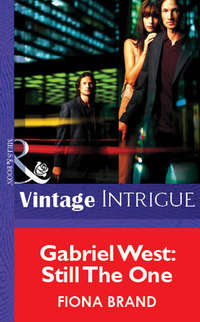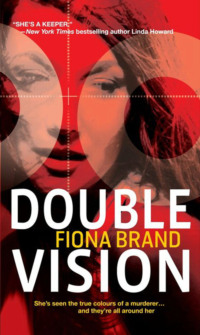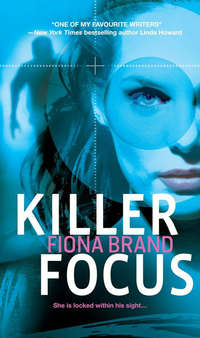
Полная версия
Blade's Lady

“Fiona Brand has become one of my favorite writers. She has that magic touch with heroes that gets me every time.”
—New York Times Bestselling Author
Linda Howard
It was him, she thought starkly. Her knight.
He said she’d been unconscious. Maybe she still was, because the man gripping her arms could have strode straight from her dreams. She knew those midnight eyes, the bold slant of his cheekbones, the exotic hollowing beneath; the carnal promise of that mouth framed by that squared warrior’s jaw.
In her dreams he had been vague, veiled, as if a mist had obscured her vision, shifting occasionally to allow tantalizing glimpses. Now it was as if a strong wind had blown the mist away; he was pulled into sharp focus, and he was…overwhelming.
Dear Reader,
What is there to say besides, “The wait is over!” Yes, it’s true. Chance Mackenzie’s story is here at last. A Game of Chance, by inimitable New York Times bestselling author Linda Howard, is everything you’ve ever dreamed it could be: exciting, suspenseful, and so darn sexy you’re going to need to turn the air-conditioning down a few more notches! In Sunny Miller, Chance meets his match—in every way. Don’t miss a single fabulous page.
The twentieth-anniversary thrills don’t end there, though. A YEAR OF LOVING DANGEROUSLY continues with Undercover Bride, by Kylie Brant. This book is proof that things aren’t always what they seem, because Rachel’s groom, Caleb Carpenter, has secrets…secrets that could break—or win—her heart. Blade’s Lady, by Fiona Brand, features another of her to-die-for heroes, and a heroine who’s known him—in her dreams—for years. Linda Howard calls this author “a keeper,” and she’s right. Barbara McCauley’s SECRETS! miniseries has been incredibly popular in Silhouette Desire, and now it moves over to Intimate Moments with Gabriel’s Honor, about a heroine on the run with her son and the irresistible man who becomes her protector. Pat Warren is back with The Lawman and the Lady, full of suspense and emotion in just the right proportions. Finally, Leann Harris returns with Shotgun Bride, about a pregnant heroine forced to seek safety—and marriage—with the father of her unborn child.
And as if all that isn’t enough, come back next month for more excitement—including the next installment of A YEAR OF LOVING DANGEROUSLY and the in-line return of our wonderful continuity, 36 HOURS.

Leslie J. Wainger
Executive Senior Editor
Blade’s Lady
Fiona Brand

www.millsandboon.co.uk
Thank you to coroner Heather Ayrton for supplying me with all the interesting information on missing persons, and for telling me what I really wanted to know—how to make the missing person fit my plot.
FIONA BRAND
has always wanted to write. After working eight years for the New Zealand Forest Service as a clerk, she decided she could spend at least that much time trying to get a romance novel published. Luckily, it only took five years, not eight. Fiona lives in a sub-tropical fishing and diving paradise called the Bay of Islands with her husband and two children.
Contents
Prologue
Chapter 1
Chapter 2
Chapter 3
Chapter 4
Chapter 5
Chapter 6
Chapter 7
Chapter 8
Chapter 9
Chapter 10
Chapter 11
Chapter 12
Chapter 13
Chapter 14
Chapter 15
Chapter 16
Chapter 17
Epilogue
Prologue
Sixteen years earlier, Australia
Eleven-year-old Anna Tarrant clung, wet and shivering, to the log that jutted boldly from the riverbank. The brutal strength of the current pinned her against the thick trunk with such force the breath was pressed from her lungs. Water swirled and tossed icily around her face, threatening to push up into her nostrils, into her mouth—threatening to fill her up, then drag her down.
The sound of her name registered above the pounding rush of the river that usually wound, slow and shallow, through the contoured hills of the Tarrant estate. Anna’s head jerked up, eyes straining wildly to see beyond the pitch-black curve of the undercut bank to the night sky, which was thickly studded with stars and awash with the cold light of a full moon. Violent shivers made her teeth clack together like castanets.
Henry de Rocheford. Her stepfather.
He reached down, his hand wavering before her eyes. It was his left hand. She could see the ancient, heavy gold of her father’s signet ring on his finger, could almost read the inscription that went with the distinctive Tarrant crest.
Anna stared at the ring with stark misery, and grief for her father shuddered through her small, thin body. She intensified her grip on the log, refusing to reach out to her stepfather. He would let her go.
He would let her be swept away, pulled down into the dark, strong coils of the river. She knew that because, when she had slipped on the muddy bank further upstream while calling for her missing puppy, Toto, Henry’s helping hand had sent her plunging into the water.
After an eternity of time, Henry’s wavering face and hand were replaced by another’s—William, the gardener. His craggy face was crumpled with concern, eyes wide with fear, not empty, like Henry’s.
Reaching out to William was another thing entirely. Anna was afraid to release her grip on the tree. She was cold, so cold, her fingers numb. She could no longer feel what she was holding on to. Her mind felt slow, stupid. She was afraid that if she let go with one hand, her whole body might let go, and then she would be snatched away. Gone. Like her father. And now Toto.
She didn’t want to die.
Terror exploded deep inside her chest, shoved her heart into overdrive and robbed her lungs of precious oxygen. For a moment she thought she would lose consciousness, and in an act of sheer panic she squeezed her eyes shut and reached out in her mind, seeking the magical inner place she’d found, searching with a sharp-edged desperation for him. Her secret friend.
Ever since Mama had married Henry, Anna’s secret friend had been there when she needed him, and now she needed him very, very badly. Anna wasn’t sure who or what he was. She had decided early on that he wasn’t an angel, although, from the shadowy details she’d been able to make out, he was beautiful enough to be one. There was a hum of energy, of excitement, about him that just didn’t fit with angel’s wings.
He was probably a knight. Her knight.
The sound of her name penetrated the odd, lucid calm that had settled over her. It came again, more urgent this time, and Anna’s lids flickered sleepily. She felt dazed, disoriented, caught between the dizzying delight of that inner place and the relentless, numbing power of the river.
William leaned lower, hanging directly over her, and for a moment Anna thought that he might tumble into the river, too. His powerful hand wrapped around her wrist—the heat of it searing—and she realised with a beat of fear just how cold she had become.
Abruptly, she was hauled up the bank, her body leaden as a puppet’s. William was talking to her, low words of comfort, as he stripped off his jacket and wrapped her in its blissful warmth.
Henry’s face loomed. Fear rocketed through her, and, despite the shattering cold, she went rigid. She could feel the anger emanating from him like the spill of cold air from a freezer. She had long since learned to conceal the “oddness” of her senses, but now the strangeness rose up inside her like a primitive cry of warning.
She tried to speak, but her vocal chords were as paralysed as the rest of her. In a convulsive movement, she clamped her arms around William’s neck and clung to him as fiercely as she’d clung to the log in the river. He kept hold of her.
As if from a great distance, she heard snatches of Henry’s smooth, creamy voice, the rhythm of it rich and soft. Measured. “Tried to save her…as unstable as her mother…needs special care…”
William’s voice rumbled deep in his chest, the word “hospital” little more than a vibration.
A whispery sob slipped past the raw tightness binding Anna’s throat as she burrowed in against his burly chest, burying her face in the rough folds of his sweater. If she was taken to hospital, she would be safe.
For a while.
She needed him.
Seventeen-year-old Blade Lombard clawed his way out of the dream, breathing hard. For long moments he was rigid, frozen, disorientation robbing him of the simple motor skills required to shove himself free of the tangled mess he’d made of the bed.
Moonlight flooded his room with ghostly white light, spilled starkly over the collapsed pile of books on his desk, the football plunked down in the middle of his geography project, the Walkman he blasted his ears with while he did homework.
With a stifled oath, he catapulted to his feet, strode naked to the window and pushed it wide. The chill of the hardwood floor was an anchor to reality he desperately needed as he braced both hands on the sill and leaned out, gulping in the liquid coolness of the night air. A fitful breeze drifted across his skin, bringing with it the familiar scents of his mother’s roses and freshly cut lawn, drying the sweat that slicked him from head to toe.
Blade shook his head in an attempt to clear the lingering sense of urgency, the miasma of despair, that still clung to him like heavy layers of wet clothing.
Even though he was only seventeen, he was already over six feet tall and broad in the shoulders. If he woke up sweating and shaking it should have been from a wet dream, not—his jaw clenched—not because a child had called out to him somewhere inside his head. Not because he could see the dark swirl of the water trying to drag her down, know that she was cold, intensely cold, and afraid.
Dammit, if she really did exist outside his dreams, he didn’t know what he could do to help. He didn’t know where she was, or even who she was.
He was beginning to wonder who he was.
All he knew for sure was that the child had been haunting him for the past year, and that she was alone—so alone he could taste it.
Pushing himself away from the window, Blade quartered the room in a silent prowl, not wanting to rouse his brothers, who had rooms on either side of his, but he was too wound up to sleep again just yet.
Oh yeah, there was one other thing he knew for sure, he thought grimly. If he ever told anyone he heard voices inside his head, and that the little girl had become so real to him that he was worried about her, they wouldn’t just think he was crazy, they would know it.
Chapter 1
Present day, Auckland, New Zealand
It was raining as Anna left the library, a slow drift of icy drizzle condensing out of darkness, swirling with a ghostly brilliance in the yellowish glare of sodium streetlamps.
She slipped on her raincoat as the heavy double doors were locked behind her and the tall, taciturn man who pulled late shift at the front desk flipped up the hood of his voluminous black coat and hunched into the night like a large, disgruntled bird searching for its roost.
Shoving long tendrils of hair back from her face, Anna strode down the shallow stone steps, gripped her briefcase and mentally prepared herself to be gently soaked before she reached the doubtful sanctuary of her flat.
Habit had her searching the shadows, checking the street, the cars. Nothing was out of the ordinary, but that wasn’t how she felt. Tonight she felt spooked, uneasy…haunted.
Despite her tension, a wry smile softened the line of her mouth. Haunted enough to consider that she might actually be cursed with some of the more spectacular preternatural talents of her Montague ancestors, which her grandmother had once regaled her with, along with the glories and history of her ancient, almost extinct family.
Extinct, that was, except for her.
The brief flicker of amusement disappeared. The stark fact that, since the death of her mother, Eloise, just months ago, Anna was the last of the Montague line, and almost the last of her father’s family—the Tarrants—also sat uneasily with her tonight, although she didn’t usually allow herself the luxury of dwelling on either her loneliness or her isolation.
But then, she didn’t often find a notice in the local newspaper declaring her to be legally dead.
A shudder swept her, part remnant of the fear that had shaken through her that morning when she’d read the neat black print, part winter chill. The dank coldness swirled and clung, threatening to penetrate her thin coat and sink in all the way to the bone.
She should have expected something like this. Her stepfather, Henry de Rocheford, had to be as aware as she was of her approaching birthday and what it would mean for both of them. They’d played a cat and mouse game for years, but now Henry had run out of time.
He wanted her dead.
Her stomach lurched. The knowledge still had the power to terrify her.
Henry hadn’t succeeded in killing her…yet, but he’d come close several times. The last attempt had been seven years ago, sending her into hiding. Now it seemed he had found a better way. He was trying to dispose of her, legally, before she reached her twenty-seventh birthday and qualified for control of her father’s massive mining interests—Tarrant Holdings—which had been held in trust for her.
The situation was tangled, frightening…potentially deadly. De Rocheford was a man of great intellect and power, a handsome, charismatic man with all the outward trappings of a gentleman and the resources of the Tarrant wealth at his fingertips. He was her father’s half-brother, and although he had no direct claim on his half-brother’s estate, he now controlled the company by virtue of his marriage to Anna’s mother shortly after Hugh Tarrant’s death.
A passing car sent cold mist pluming off the road, wreathing parked cars in a shimmering, ever-dissolving shroud as the drizzle intensified. Anna quickened her pace, her brisk step sounding oddly flattened, as if the mist and drizzle served to muffle even the sharpest sound. As she passed from the relative brightness of the library car park into the badly lit stretch of sidewalk that bordered Ambrose Park, she had the oddest notion that the night would swallow her whole.
She shouldn’t have delayed in the musty warmth of the library, huddling over her research materials, trying to lose herself in the medieval treasure trove of the Crusades, the beauty and the brutality, the rich splendour and intellect that rubbed cheek by jowl with ignorance and grinding poverty. It hadn’t worked. She hadn’t gotten any further along with the novel she was writing, all she had gained was a headache and gritty eyes that she would regret tomorrow, when she had to spend twelve hours solid on her feet at Joe’s Bar and Grill. Her mind had been consumed with that damned legal notice and her attempt to contact Tarrant’s lawyers earlier in the day.
An attempt that had failed.
Emerson Stevens, the partner who dealt with Tarrant business, most definitely hadn’t been able to see her. He had been killed in a hit-and-run accident just weeks before. The receptionist had been pleasant but officious. If Anna wanted to see anyone else, she would have to make an appointment. Not surprising, Anna thought, since she’d turned up in her waitressing uniform—Joe’s Bar and Grill emblazoned across her chest—and given her name as Johnson.
The shabby entrance sign to Ambrose Park loomed, lit by the solitary spotlight that hadn’t been broken or stolen. The park was pleasant enough to walk across during daylight hours, but at night it was devoid of all charm and more likely to hold vagrants than lovers.
A tingling of the nerves down her spine, a cold jab of awareness, presaged a whisper of sound, the scrape of a shoe on pavement.
Anna ducked, feinted, felt the rush of air as something passed close to her head. Instinctively, she lashed out with the briefcase; it connected solidly. There was a muffled curse, a grunt as whoever had tried to hit her slipped on the slick concrete and tumbled, almost taking her with him.
A booted foot caught her heavily on one knee. She flailed, grabbed for balance, almost dropping the briefcase. Her shoulder caught the edge of one of the unevenly plastered pillars that guarded the broad entrance to the park. She reeled, still off balance, and saw the cold gleam of light travel the length of a gun barrel as the man regained his feet.
Time seemed to slow, stop, freeze her in place while her mind groped past a paralysing blankness; then fear slammed through her, and with a gasping breath she plunged into the darkness.
In abrupt contrast to the blankness of just moments ago, thoughts and decisions now tumbled in a frantic cascade. The park was her best option; the trees were closer than any building, the undergrowth thick at the edges. And it was very dark. He couldn’t shoot her if he couldn’t see her.
Clutching the case to her chest, Anna lengthened her stride, but her sneakers kept losing their purchase, slipping on the wet grass.
She risked a glance over her shoulder. A burst of adrenaline punched hotly through her as she saw the man coming after her and knew this was no ordinary mugging. She stumbled, regained her balance. A sense of unreality gripped her as she passed by the darker outline of a set of swings and a slide—innocent reminders of a childhood that for her had ended brutally in a flooded river.
Oh God. She had allowed herself to become complacent, over-confident—lulled by the knowledge that her twenty-seventh birthday was only weeks away, and then she could end this madness. She had been wrong; she’d been found. Someone had been lying in wait for her.
If it hadn’t been for that burst of awareness, honed by years of running and hiding, she would be dead. She knew that as surely as she knew that Henry had set her up.
She had made a mistake. Stupid. Stupid.
The notice in the paper had served a purpose other than the obvious legal one; it had also been a ploy to flush her out of hiding. There had been someone watching the lawyer’s office; she had been followed from there.
She should have rung Emerson Stevens instead of showing up unannounced, only to be blocked. If she’d rung, she would have found out Emerson was dead, and that there was no point in approaching Stevens, Harrow and Cooper directly yet, because with Emerson gone, there was no-one there who knew her by sight. No-one who would believe that she hadn’t died when her car had plunged over a cliff into the sea almost seven years ago. No-one who would give her the time of day without irrefutable evidence of her identity.
It was a catch-22 situation. To establish her identity, she would have to reveal herself, turn herself into a target while the wheels of justice slowly ground their course. If she had to resort to DNA testing to prove her right to her own inheritance, that could take months, and money she didn’t have.
Panic grabbed at her insides as the ruthless simplicity of Henry’s strategy sank in and eroded her confidence. Henry was nothing if not thorough. Having her declared legally dead would finalise his claim on Tarrant Holdings, then he would make the legal fiction a physical fact by having her disposed of before she had time to establish her identity.
One way or another, the shadowed half life of Anna Johnson-Tarrant would cease.
She heard the pounding of footsteps above her own, caught the edge of a guttural phrase, and panic surged again. The man was gaining. She could hear the grunting rush of his breath as he strained to catch her, almost feel the brush of his fingers as he reached to grab her clothing, a shoulder, an arm. The trees loomed close, closer, then she was among them, branches whipping at her legs, tugging at her clothing as she weaved blindly, more by instinct than sight, because it was like running into a wall of darkness. She wavered, confused, slammed head first into a tree and fell to the ground, stunned.
She rolled and crawled on—the briefcase awkward—thankful that the thick layer of leaves was too sodden to rustle. A rough oath grated, low and harsh. Light dazzled her as the beam of a flashlight swept the trees, flooding the dense brush with an unholy radiance that backlit the short, stocky man who was after her. The beam scythed over her head. She dropped flat, damming her startled breath in her throat, hugging the cold, wet earth like a hungry lover.
After an eon, he moved on. She could hear the uneven thud of his tread—as if he was limping—feel the hot pulse of a lump forming on her forehead, taste blood in her mouth.
Her head spun as she regained her feet and started in the direction opposite from the one the man was taking, feeling her way from tree to tree, lifting and setting her feet down with care. The ground was uneven, an obstacle course of jutting tree roots and slippery vegetation.
The beam swung back, almost silhouetting her. She ducked and crouched behind a tree trunk, holding her breath for long, strained moments. When the beam swung away, she once more hugged her briefcase to her chest and headed for the only source of light she could see, a blue and red glow that she knew emanated from the towering neon Gamezone sign that garishly announced the presence of the video arcade near her flat.
Minutes later, she stumbled free of the trees and stepped into…darkness.
The fall was abrupt, shocking. For long moments she lay unmoving, facedown in what she dimly recognised as the deeply carved groove of a storm drain. The smell of mud and her own fear filled her nostrils; the sound of her racing heart jackhammered in her ears. She still had her briefcase; it was lodged beneath her, its hard edges digging into her stomach, her breasts. She was going to have bruises—lots of them.
Pushing herself onto her hands and knees, she gripped the case and fought to still the sickening spinning in her head. She fingered the tight, tender lump already forming there.
Clutching a fistful of icy grass, she began to climb out of the ditch. She was almost out, so close, when she lost her footing and, hampered by the awkward weight of the case, tumbled back. A sound broke from her throat. Pain flared, as if someone had just driven a thick spike through her skull, then dissolved into swirling shards of darkness.
Just before the blackness claimed her completely, the elusive threads of the old familiar fantasy she used to escape into when she was a child—and sometimes even now, when she dreamed—wound through her mind.
Her knight.
His face shimmered into vague focus: the long hair, black as midnight satin; fierce, dark eyes; the strong chiseled planes and angles of a face that was both grimly handsome and exotically sensual. Oh yeah, he was a fantasy, all right. Why couldn’t you be real? she thought hazily.
Right now, the fantasy, pretty as it was, just didn’t do the job.
Blade shoved free of the bed. And the dream.
His heart was pounding, his skin damp with sweat, his chest heaving like a bellows. He swore, a low, dark rumble of sound. Dragging unsteady fingers through his hair, he fought to banish the image of mist and rain and darkness. Trees, lots of trees, and a pulsing neon sign. The woman, lying crumpled on the ground, afraid…hunted. A dark bank rearing overhead.








